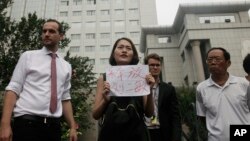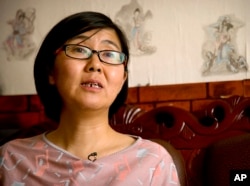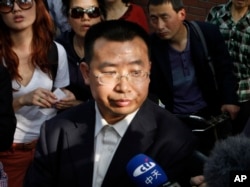Monday marks three years since China began a sweeping crackdown on human rights lawyers, Wang Quanzhang is still being held incommunicado and forbidden to meet his family or lawyers.
With Wang being the last one awaiting trial, the crackdown, which has seen more than 320 rights activists arrested or harassed, continues to raise concerns about the mistreatment of detainees in custody.
Wang’s wife, Li Wenzu, says she has born witness first-hand to the Chinese government’s suppression of her husband and all those who were caught up in the crackdown.
“He [Wang] was [officially] indicted on Feb 14th, 2017 [for subversion of state power]. In the past year, no one [from the judiciary system] has dared to meet or brief us. I’m still not informed of his whereabouts no matter how many agencies I’ve tried to petition for my husband,” Li told VOA over the phone.
“The entire crackdown itself is a man-made miscarriage of justice, based on false accusations. It’s unlawful,” she said after having spent more than 1,000 days petitioning and looking for her husband.
VOA’s calls to news liaison offices of the procuratorate in Tianjin, which is still reviewing Wang’s case, went unanswered.
Call for Wang’s release
Wang hasn’t been heard from since his arrest, which has many worrying if he is still alive.
Sunday, rights activists in Hong Kong, organized by Human Rights Lawyers Concerned Group, marched to the Chinese government’s liaison office, calling for Wang’s immediate release.
They further called for the Chinese government to cancel administrative penalties including license revocations imposed on more than a dozen of the Chinese rights defenders.
The Hong Kong-based rights group’s statistics found 16 rights lawyers and three law firms in China have been notified of their loss of license, most of which is related to the 2015 crackdown.
“I think that’s equally unfair and culpable. And it’s seeking to deprive the livelihood and rights to work of these lawyers. Certainly, we’re openly condemning it. I think this is the continuation of the crackdown,” the Hong Kong-based group’s chairman Albert Ho said.
Details of torture
The fate of detainees in custody including Wang has been weighing on the minds of many especially after those who have been released reveal details of their torture. that includes forced feeding with unknown drugs, sleep deprivation, beating and verbal and psychological abuses.
Last week, lawyer Wang Yu, who was targeted early in the sweeping crackdown, told Hong Kong’s Television Broadcasting Ltd that her earlier video-taped confession was coerced.
The 47-year-old lawyer said she pleaded guilty of subverting state power after authorities threatened to harm her son.
Coerced confession
“Authorities said that if I plead guilty in accordance with their pre-prepared materials, I would have a chance to reunite with my son,” the TV network cited Wang as saying.
Wang said, during interrogation, she was tied to an iron chair for five long days, deprived of sleep and confined in a small corner without enough room to stretch her legs.
Wang was released on bail in late 2016 and sent her son overseas to study early this year.
She complained authorities have confiscated her and her husband’s passports, while being unresponsive to when she will be allowed to resume her practice.
Wang’s defense lawyer, Wen Donghai, says he does not believe the Chinese government would redress its wrongdoing and allow many rights lawyers to work again.
“Based on their past track record, Chinese authorities rarely admit their own mistakes and correct their wrongdoing. For example, will it redress its mistake and give me back my lawyer license? I doubt it. Given the current political climate, it’s impossible,” Wen said.
Wen said if it weren’t for rights lawyers, who had worked as a buffer, Chinese authorities would have to face angry petitioners head-on.
Forced medication
Observers allege China is indifferent to charges of torture in its prisons.
Jin Bianling, wife of lawyer Jiang Tianyong, suspects her husband has been under forced medication as observations from her father-in-law’s recent visit to jail showed.
In late 2017, Jiang was given a two-year sentence for inciting state subversion and will serve his time until the end of February next year.
“He [Jiang] said that he takes medicines twice a day. Yet he’s suffered a serious loss of memory. He can’t remember much, including basic information such as what grade their daughter is in or his own home number,” Jiang said, relaying message from her father-in-law.
Jin, who has lived in the U.S. with her daughter since 2013, said that she filed a petition in late June to disclose Jiang’s medication, but the administration of prisons in Henan province hasn’t replied.
VOA’s calls to the administration went unanswered.
Call for international pressure
Following renewed allegations of coerced confession and medication, international rights groups have called on other nations to continue to pressure China into ending the crackdown.
Ho, however, said that it is “disappointing” and “short-sighted” that Western democracies have put their priorities on maintaining good diplomatic relations with China despite the country’s poor human rights record.






